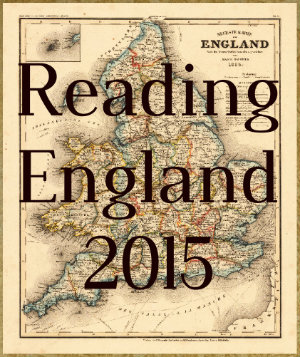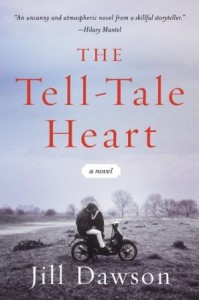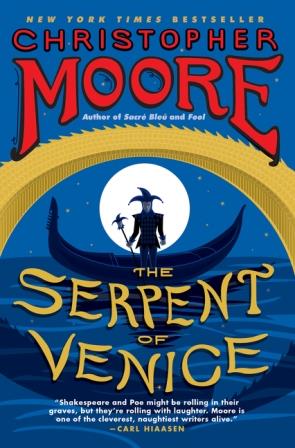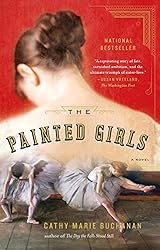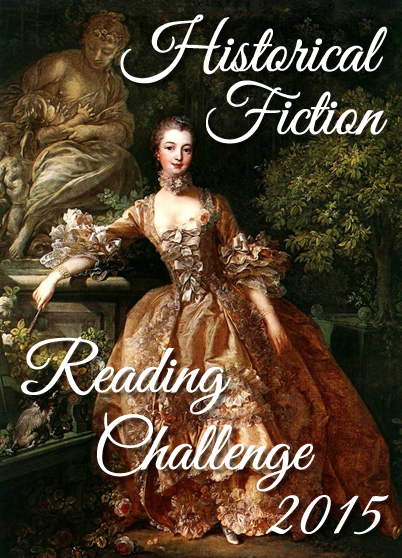 I read William Shakespeare’s comedy As You Like It as my selection for the Renaissance era in the Literary Movement Reading Challenge. I had been wanting to read it ever since reading James Shapiro’s excellent book, A Year in the Life of William Shakespeare: 1599.
I read William Shakespeare’s comedy As You Like It as my selection for the Renaissance era in the Literary Movement Reading Challenge. I had been wanting to read it ever since reading James Shapiro’s excellent book, A Year in the Life of William Shakespeare: 1599.
For those not familiar with the plot, it’s one of Shakespeare’s cross-dressing comedies. Rosalind is the daughter of Duke Senior, the rightful duke. Duke Senior’s younger brother, Duke Frederick usurps his older brother’s dukedom. Frederick allows Rosalind to stay when he exiles his brother to the Forest of Arden because his daughter Celia loves Rosalind so much. Frederick arranges a wrestling match that is supposed to end in defeat for Orlando de Boys, but Orlando is victorious. He captures Rosalind’s heart. In a fit of pique, Frederick banishes Rosalind. However, Celia decides to leave with Rosalind as the two are close, and Celia cannot bear to see Rosalind exiled without her company. They decide to disguise themselves, Rosalind as a boy, Ganymede, and Celia as Ganymede’s sister Aliena, and they also decide to take the fool Touchstone with with them to keep them company. They plunge themselves into the forest, where they find Orlando has been carving Rosalind’s name on trees.
While in the forest, they encounter shepherds who help them find shelter. The shepherd Silvius is in love with a woman, Phoebe, who falls in love with Ganymede, not realizing Ganymede is Rosalind in disguise. Meanwhile, Orlando is hiding from his brother Oliver, who wants him dead. Orlando rescues Oliver from a lion in the forest, which leads to Oliver’s decision to change his ways. In typical Shakespearean fashion, everything works out in the end with a bunch of marriages. Oliver is further transformed by love for Celia and no longer desires Orlando’s destruction. Orlando and Rosalind find happiness. Rosalind manages to set Silvius and Phoebe together in a problematic marriage, and even Touchstone marries Audrey. Duke Frederick experiences a religious conversion and sees the error of his ways.
As Shakespeare goes, it’s not my favorite. I much prefer A Midsummer Night’s Dream as a comedy. However, I do see maturity in his characterization of Rosalind that had me wondering greatly about the boy actors in his acting company at the time he wrote the play. It would have taken a strong actor to pull off that part. I found her to be a refreshingly smart character, and in control of so much of the action. I liked her very much. As You Like It is perhaps most famous for Jaques’s speech “All the world’s a stage.”
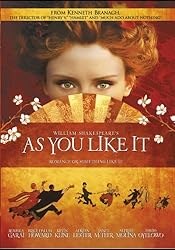 I waited to watch the film version directed by Kenneth Branagh and starring Bryce Dallas Howard as Rosalind before reviewing the book. She is a wonderful Rosalind. The cast is great: Celia is played by Romola Garai, Touchstone by Alfred Molina, the Dukes by Brian Blessed, Orlando by David Oyelowo, Jacques by Kevin Kline, Audrey by Janet McTeer, and that’s just a start. Set in feudal Japan, the story begins as Duke Frederick and a bunch of ninjas take over Duke Senior’s palace and send the rightful Duke and his men into exile in the forest. The setting change was interesting and still worked despite the importance of the Forest of Arden as setting in the play. The costumes were beautiful. The actors were fine. But I still didn’t like it, and I don’t know why. I liked parts of it, but as a whole, it was just sort of boring. I kept picturing how my students might respond to it if we watched in class, and I kept picturing them nodding off. I wonder if the issue with this play is that in order for this story to remain compelling, the action needs to move a little more quickly? I can’t put my finger on what was wrong with it, as I liked the elements separately. They just didn’t cohere for me. Your mileage may vary if you decide to watch it.
I waited to watch the film version directed by Kenneth Branagh and starring Bryce Dallas Howard as Rosalind before reviewing the book. She is a wonderful Rosalind. The cast is great: Celia is played by Romola Garai, Touchstone by Alfred Molina, the Dukes by Brian Blessed, Orlando by David Oyelowo, Jacques by Kevin Kline, Audrey by Janet McTeer, and that’s just a start. Set in feudal Japan, the story begins as Duke Frederick and a bunch of ninjas take over Duke Senior’s palace and send the rightful Duke and his men into exile in the forest. The setting change was interesting and still worked despite the importance of the Forest of Arden as setting in the play. The costumes were beautiful. The actors were fine. But I still didn’t like it, and I don’t know why. I liked parts of it, but as a whole, it was just sort of boring. I kept picturing how my students might respond to it if we watched in class, and I kept picturing them nodding off. I wonder if the issue with this play is that in order for this story to remain compelling, the action needs to move a little more quickly? I can’t put my finger on what was wrong with it, as I liked the elements separately. They just didn’t cohere for me. Your mileage may vary if you decide to watch it.
Rating: 




Film Rating: 




Set in Warwickshire, this book will serve as my entry for that county in the Reading England Challenge and will serve as my Renaissance selection for the Literary Movement Challenge.
